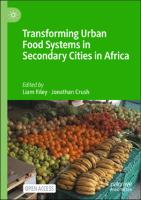Transforming Urban Food Systems in Secondary Cities in Africa
Contributor(s)
Riley, Liam (editor)
Crush, Jonathan (editor)
Language
EnglishAbstract
Countries across Africa are rapidly transitioning from rural to urban societies. The UN projects that 60% of people living in Africa will be in urban areas by 2050, with the urban population on the continent tripling over the next 50 years. The challenge of building inclusive and sustainable cities in the context of rapid urbanization is arguably the critical development issue of the 21st Century and creating food secure cities is key to promoting health, prosperity, equity, and ecological sustainability. The expansion of Africa’s urban population is taking place largely in secondary cities: these are broadly defined as cities with fewer than half a million people that are not national political or economic centres. The implications of secondary urbanization have recently been described by the Cities Alliance as “a real knowledge gap”, requiring much additional research not least because it poses new intellectual challenges for academic researchers and governance challenges for policy-makers. International researchers coming from multiple points of view including food studies, urban studies, and sustainability studies, are starting to heed the call for further research into the implications for food security of rapidly growing secondary cities in Africa. This book will combine this research and feature comparable case studies, intersecting trends, and shed light on broad concepts including governance, sustainability, health, economic development, and inclusivity. This is an open access book.
Keywords
urban food systems; food security; urban food systems in Africa; sustainable food systems; urban development; co-productive urban planning; food system governance; African secondary cities; urban livelihoods; sustainable cities; African Secondary City Food Systems; food governance; food insecurityDOI
10.1007/978-3-030-93072-1ISBN
9783030930721, 9783030930721Publisher
Springer NaturePublisher website
https://www.springernature.com/gp/products/booksPublication date and place
Cham, 2023Imprint
Palgrave MacmillanClassification
Human geography
Sociology
Public administration
Sustainability
Central / national / federal government policies


 Download
Download